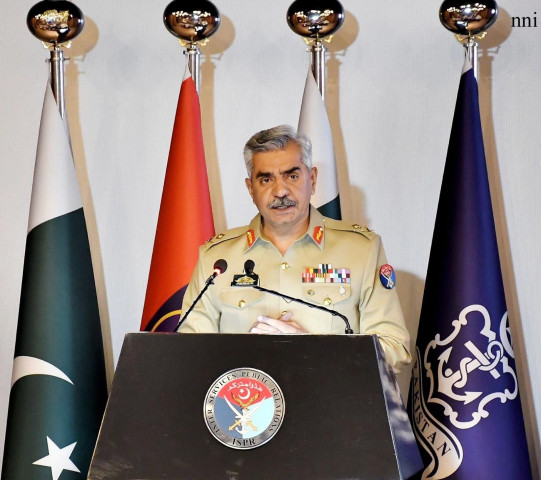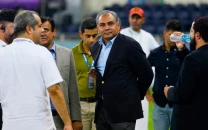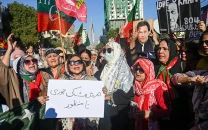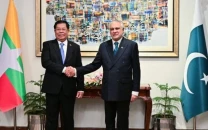No conspiracy, demarche given on interference: DG ISPR
Army spokesperson says COAS not seeking extension

The army has categorically said that the word “conspiracy” was not mentioned in the communiqué issued following the meeting of the National Security Committee (NSC) last month.
The military’s stance came after former prime minister Imran Khan accused Washington of backing his ouster because he had visited Moscow against US advice. Washington denies the charge.
Imran initially blocked the no-confidence move, saying a forum of civil and military leaders, the National Security Committee, had endorsed the alleged conspiracy.
"You can see clearly whether there's any word of conspiracy in that statement. I don't think so," said Director-General Inter-Services Public Relations (ISPR) Major General Babar Iftikhar at a news conference in Rawalpindi on Thursday.
LIVE #APPNews : DG ISPR Major General Babar Iftikhar addresses Press Conference – 14th April, 2022 #Rawalpindi @OfficialDGISPR https://t.co/yxDg1TdwaS
— APP 🇵🇰 (@appcsocialmedia) April 14, 2022
He was referring to an NSC statement this month which had expressed concern over non-diplomatic language used in a cable from a "foreign country", widely assumed to mean the United States, about the no-confidence vote.
At the start, the chief military spokesperson told reporters that unlike the past he would respond to any questions they might ask.
The first question he was asked was about the military leadership’s stance regarding alleged foreign conspiracy against the government of former prime minister Imran Khan.
General Babar said the military leadership had given its view during the NSC meeting, which was reflected in the statement issued afterward.
He went on to explain that the word “conspiracy” was never used in that statement, implying the military leadership never believed there was a foreign conspiracy to oust the former prime minister.
He said the minutes of the NSC meeting could be declassified if the government wants it for further clarity.
To another question, the DG ISPR explained that demarche was issued to the United States because the language used in the "diplomatic cable" was undiplomatic that amounts to “interference” in the country’s internal matters.
The PTI claimed that the DG ISPR's statement vindicated its stance of foreign interference. However, sources explained that in the diplomatic language, the word “interference” did not mean “conspiracy”.
The DG ISPR also revealed that the US had never asked for air bases in Pakistan. "The US has never asked for air bases in Pakistan. Had they asked for the facility, our response would have been absolutely not," the DG ISPR said.
In an another significant statement, General Babar categorically stated that Army chief General Qamar Javed Bajwa would retire on November 29, 2022. Neither would he seek extension nor accept any if offered, the spokesperson added.
The DG ISPR also explained that the army’s role was apolitical and a decision was taken not to get embroiled in political matters. He also said democracy was the only way forward for Pakistan, announcing the army would never impose martial law in the country.
Talking about the role of the armed forces in the country's politics, Babar said the army has "nothing to do with politics" and added the institution has decided to remain apolitical in the future as well. "A better word than neutral is apolitical for describing our role," said the army spokesperson."
Read: Retired generals denounce malicious audio clips attributed to them
"This decision was not taken to harm or benefit anyone. This is the constitutional role of the armed forces which we are trying to fulfil."
"Whatever happened during the last few days is not part of the constitutional process? It is not the army's place to offer someone an NRO."
The military spokesperson also dismissed claims that it was the establishment which suggested options to the former prime minister for finding a way out of the political impasse.
Instead, he disclosed that it was the former prime minister who asked the military leadership for help.
The chief military spokesperson also rejected the notion that Pakistan’s nuclear programme was under threat due to the change of government. He said all political parties and governments had their fair share in advancing the nuclear programme and, hence, this must not be discussed and questioned.
To another question, Gen Babar said the army chief couldn't attend the oath taking of Prime Minister Shehbaz Sharif because he was not well.
Gen Babar also dismissed rumours of the establishment meeting opposition parties before the vote of no confidence against Imran. "There is no truth to this," he said and added there were no such contacts and "no deal" was done.
Reaffirming that the army or the establishment had the “best relations with the government”, the head of the military’s media wing assured there was no disagreement between the institutions.
“I would say that the army chief has very good personal relations with Imran Khan and mutual respect and it will stay the same. Parties and governments change but the army meets them all and there are no issues or problems.”
When asked about the events on the night of April 9 and rumours of an impending martial law, Gen Babar said there was no such thing happening at the time. "Do you have any evidence of it? Are courts under the army? Our courts are free and if something happened at the courts, it was their own action."
"It is the duty of everyone to strengthen democracy and the strength of our democracy is our national institutions: whether it is parliament, the Supreme Court or the armed forces. Pakistan will progress with democracy."
"There will never be another martial law in Pakistan," said the military spokesperson.
Dispelling another rumour regarding the army chief's absence from the oath-taking ceremony of Prime Minister Shehbaz Sharif, the army spokesperson said Gen Bajwa was "not well".
"He was not well that day and had not even come to the office. That is a simple explanation and there is nothing more to it."
Referring to former premier Imran’s visit to Russia, Gen Babar said the army was on board with the decision to go to Moscow and said there was “institutional input” that he should go. “It was not in anyone’s wildest dreams that they [Russia] would start the war when the prime minister was there and it was obviously very embarrassing.”
Answering a question regarding the United States asking for operational bases within Pakistani territory and former premier Imran Khan's reply of "absolutely not", the military spokesperson clarified that if bases were asked for, the "army would have the same stance".
"And in reality, they did not even ask for the bases and there was no mention of it at any level."
During the media briefing, he also said that rallies were a part of democracy and the army has “provided an enabling environment to the people by risking its lives”.
“There is nothing wrong with the people coming out and expressing their thoughts,” he added and further said that some stability was returning to the country but it would take time to keep it sustainable.
"Political stability drives everything. National security rests on it."
In regards to the 'malicious' social media campaign against the armed forces, when the spokesperson was asked what the military was doing to curtail the activity, Gen Babar said it is the responsibility of the government to take measures according to law as the military does not have the power to do so.


















COMMENTS
Comments are moderated and generally will be posted if they are on-topic and not abusive.
For more information, please see our Comments FAQ